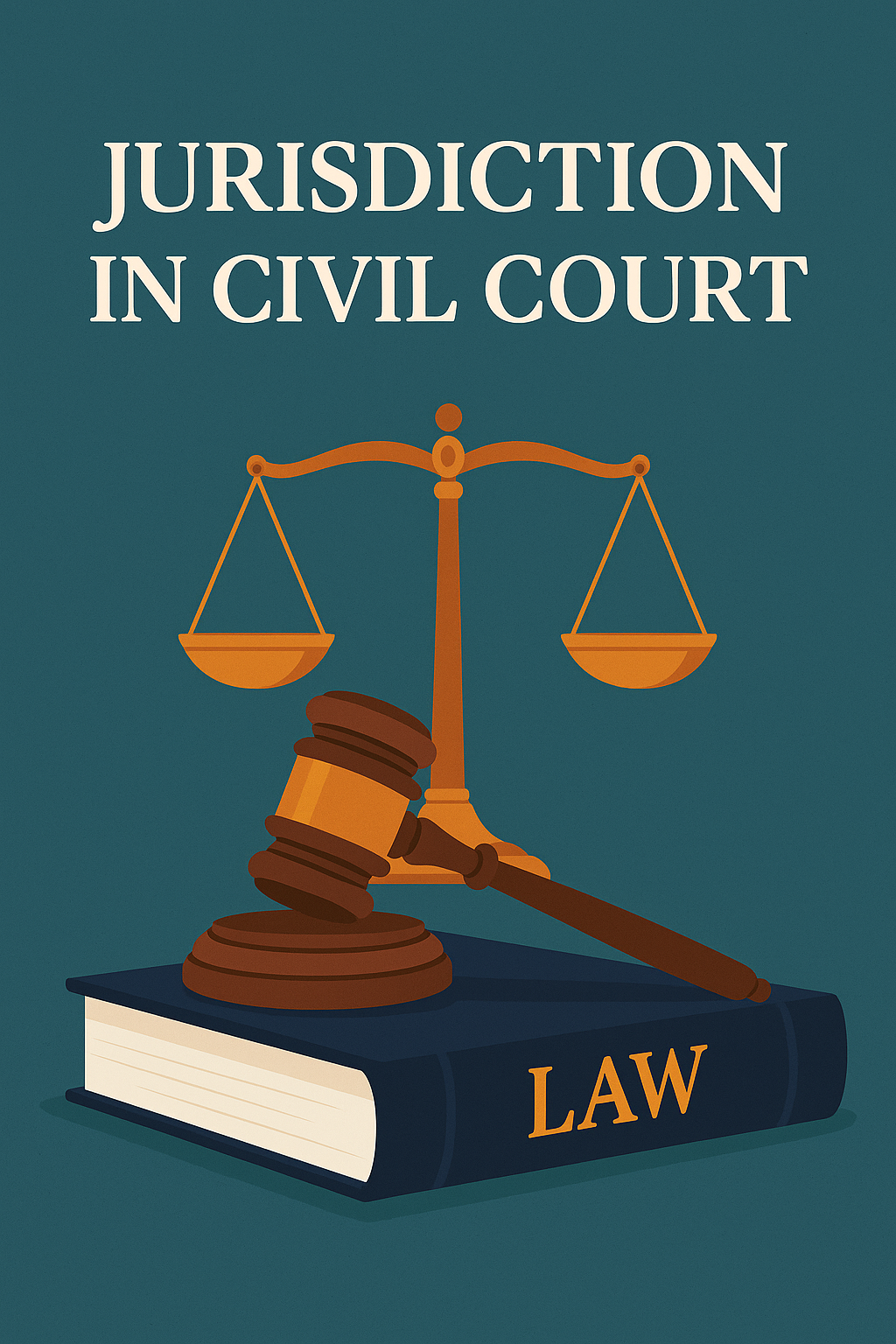Suppose you’re in a legal conflict—maybe over an unpaid loan, damage to your property, or a contract that wasn’t honored. Can you simply walk into any court and ask for justice? The answer is no, because not every court has the authority to hear every case. This authority is what we legally refer to as jurisdiction. lets discuss Jurisdiction in Civil Court
Think of jurisdiction as a court’s “permission slip” to hear and decide a case. A judge cannot proceed with a case unless the court has jurisdiction. If a court goes beyond this legal boundary, its decision may be considered void and unenforceable. This makes jurisdiction a fundamental concept in the justice system—essential knowledge for law students, legal professionals, and any aware citizen.
- The Two Core Types of Jurisdiction Jurisdiction in Civil Court
At its core, jurisdiction answers two critical questions:
- What type of court has the authority to hear this case?
(Is it a civil court, criminal court, family court, etc.?) - Which particular court has authority over the people or the subject involved?
(Is it the court in Delhi, Mumbai, or elsewhere?)
The Two Core Types of Jurisdiction Jurisdiction in Civil Court
In civil matters, jurisdiction typically has two key components:
- Subject Matter Jurisdiction
- Personal Jurisdiction (also known as In Personam Jurisdiction)
For a court to legally proceed, both types must exist in a given case.
1. Subject Matter Jurisdiction – What Type of Dispute Is This?
Subject matter jurisdiction refers to a court’s legal power to hear certain categories of cases. Different courts are structured to handle different kinds of legal issues.
Examples of subject matter jurisdiction:
Civil Courts
Handle disputes between individuals or organizations that do not involve criminal offenses. These may include:
- Contractual issues: Breach of contract, enforcement of terms.
- Torts: Personal injury, negligence, defamation.
- Property conflicts: Ownership, tenancy issues.
- Consumer cases: Buyer-seller disputes.
Specialized Courts
Many jurisdictions have courts with a narrow focus. These include:
- Family Courts: Deal with divorce, child custody, maintenance, and domestic violence cases.
- Probate Courts: Handle wills, inheritance, and guardianship.
- Bankruptcy Courts: Focus on insolvency and debt-related cases.
- Small Claims Courts: Address low-value financial disputes in a simplified and speedy manner, usually without lawyers.
Why does it matter?
You can’t file a divorce case in a criminal court or take a serious criminal case to a small claims court. Each court’s role is clearly defined. If a case is filed in the wrong court, the ruling can be dismissed for lack of jurisdiction.
2. Personal Jurisdiction – Over Whom Can the Court Exercise Power?
While subject matter jurisdiction deals with what the case is about, personal jurisdiction focuses on who the court has authority over—typically the defendant.
A court must have a legal connection to the person being sued. Without personal jurisdiction, a court’s judgment won’t bind the defendant.
How is personal jurisdiction established?
Here are the main ways:
- Physical Presence and Service: If the defendant is physically present in the court’s territory and is officially served legal papers there, the court usually gains jurisdiction.
- Domicile or Residency: If the person lives in the state or territory where the court sits, jurisdiction generally applies—even if they aren’t physically present during the legal process.
- Voluntary Submission (Consent): A defendant may agree to the court’s jurisdiction through a contract (via a “forum selection clause”) or by showing up in court and not objecting to the court’s authority.
- Minimum Contacts Doctrine: When a defendant is from a different state or country, the court can still have jurisdiction if they have significant interactions with the state. This ensures fairness, so someone can’t be hauled into court in a place they’ve had no connection with.
Examples of “minimum contacts”:
- Doing business in the state.
- Committing a wrongful act (e.g., causing injury or damage) in the state.
- Owning property within the state.
- Signing a contract that will be performed in the state.
- Selling goods or services to residents in that state (especially online or through targeted ads).
This doctrine ensures that jurisdiction is not exercised arbitrarily. A defendant should reasonably foresee the possibility of being taken to court in a state where they have built meaningful ties.
Other Important Types of Jurisdiction in Civil Matters
While subject matter and personal jurisdiction are the two primary types discussed in most civil cases, there are several other important forms of jurisdiction that significantly affect how and where civil litigation is conducted.
3. Territorial (Geographical) Jurisdiction
Territorial or geographical jurisdiction refers to the physical area over which a court can exercise its legal authority. Courts are often restricted by city, district, or state boundaries.
For example, a civil court in Mumbai typically only deals with disputes that occur within its territorial limits or involve individuals or properties located there. If a traffic accident happens in Pune, then generally, only a court in Pune would have the authority to hear that case—not a court in Delhi.
4. Pecuniary (Monetary) Jurisdiction
Pecuniary jurisdiction relates to the financial value of the claim being brought before the court. Courts are often divided by how much monetary value they can handle.
For instance, Small Claims Courts may only deal with disputes involving amounts up to ₹1,00,000. If a claim exceeds that limit—say ₹2,00,000—it must be filed in a higher court, such as the Civil Judge Senior Division, which has jurisdiction over larger-value claims.
This system ensures an efficient distribution of cases, allowing simpler and lower-value disputes to be resolved more quickly.
5. Original Jurisdiction
When a court has original jurisdiction, it is the first court to hear the case. This is typically where evidence is presented, witnesses are examined, and a verdict is delivered.
Most civil cases—like contract disputes or personal injury suits—start in courts with original jurisdiction, such as District Courts.
6. Appellate Jurisdiction
Appellate jurisdiction is the authority of a higher court to review decisions made by lower courts. These courts do not hear new evidence; they only examine whether the previous court correctly applied the law.
For example, if you lose a civil case in the District Court, you may appeal the decision in the High Court, which will use its appellate powers to review the judgment.
7. Exclusive Jurisdiction
Exclusive jurisdiction means only one specific court has the legal authority to hear a certain type of case. No other court can legally take up such matters.
For instance, in some jurisdictions, bankruptcy cases are handled solely by dedicated bankruptcy courts. Similarly, in India, certain matters may be exclusively tried by tribunals or specialized courts established by statute.
8. Concurrent Jurisdiction
Concurrent jurisdiction arises when more than one court has the power to hear a particular type of case. In such instances, the plaintiff gets to choose where to file the lawsuit—provided all necessary jurisdictional conditions are met.
For example, if a dispute involves parties from two different states and a large amount of money, both the state civil court and the federal civil court (in the U.S. context) may have the power to hear the case.
9. In Rem Jurisdiction
In rem jurisdiction refers to the court’s authority over a piece of property, rather than a person. It applies when the property itself is the center of the legal conflict, regardless of who owns it.
Examples include:
- Lawsuits to determine legal ownership of land.
- Foreclosure proceedings on immovable property.
In these cases, the court’s judgment binds the property directly.
Why Law Students Must Understand Jurisdiction
Understanding various types of jurisdiction is critical for anyone involved in legal education or practice. Here’s why it matters:
- Strategic Case Filing: Before initiating a lawsuit, it’s essential to identify the correct court. Filing in the wrong court wastes time and resources and could result in dismissal.
- Legal Research: Knowing which court has jurisdiction helps you locate the appropriate laws, precedents, and rules to apply.
- Preventing Dismissals: Courts frequently reject cases filed without proper jurisdiction. Lawyers and law students must be vigilant to avoid such errors.
- Appeals and Legal Remedies: Jurisdictional issues can be grounds for appeal. If a lower court acted outside its jurisdiction, its decision may be overturned.
- Cross-Border & International Disputes: In today’s globalized world, knowing jurisdictional rules is vital when dealing with international contracts or disputes involving foreign parties.
Conclusion: Jurisdiction – The Legal Foundation for Fair Trial
Jurisdiction isn’t just a technical rule—it forms the backbone of a fair legal process. It ensures that the court hearing a case is legally empowered to do so, both in terms of the type of case and the parties or property involved. For law students, mastering these concepts builds a strong foundation in litigation strategy, legal procedure, and case analysis.
Understanding jurisdiction is not just academic—it’s practical, logical, and essential for ensuring justice is served in the right forum.

